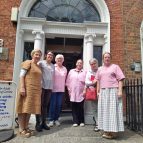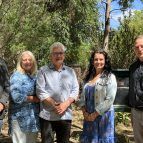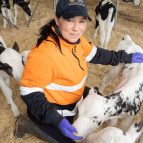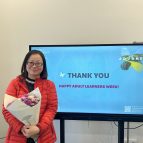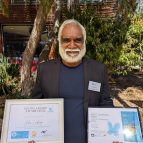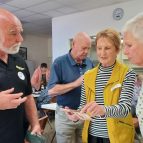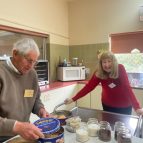Literacy takes a legal turn
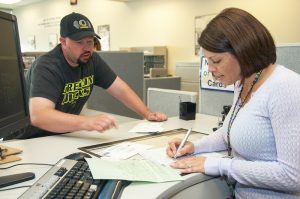 A legal literacy program in Launceston is helping adults with legal paperwork and empowering them through a better understanding of the law.
A legal literacy program in Launceston is helping adults with legal paperwork and empowering them through a better understanding of the law.
For Sadie Roberts filling out a 25-page Centrelink form is a breeze. She’s had plenty of practise.Since she started volunteering three years ago, she’s helped over 100 people fill out forms at Launceston’s Centrelink office for everything from unemployment benefit to aged care to the NDIS. Sadie isn’t surprised that there’s such a demand for her help. She spent 20 years as a teacher and later working at the State Library and she’s seen first hand how daunting paperwork can be for many adults.
Sadie is one of 70 active volunteers based at Centrelink offices, libraries and Neighbourhood Houses in north and north eastern Tasmania trained to help people with form filling and when needed, referring them to lawyers, financial advisors or other relevant support services.
The volunteer program was established in 2011 when Launceston’s Community Legal Centre realised how much of their solicitors’ time was spent helping clients fill in forms. Nicky Snare, chief executive of the Community Legal Centre, says, ‘We thought why don’t we train lay volunteers based out in the community who can take the pressure off our service and free up our solicitors to provide legal advice to more clients?’ Tasmania has one of the lowest literacy rates in the country and this is compounded by the complex and often arcane language of legal documents.
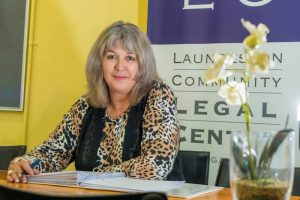
Higher levels of literacy among adults required today
‘We’ve found that people are required to have higher levels of literacy than in the past. There’s an awful lot of acronyms and the language can be confusing. For people who struggle with literacy a one page form might be do-able but when they are 25 pages long they can be overwhelming. We’ve had people with university degrees asking our volunteers for help,’ Nicky says.
More than 250 volunteers have undergone training since 2011 and have helped 3250 people. ‘It’s had a huge impact. At the Community Legal Centre instead of seeing 400 people a year the same number of solicitors have seen 1500–1700 people a year on average over the last 7 years,’ Nicky says.
Volunteers play an important role not just in helping people with forms and applications. They are trained in recognising and preventing the escalation of potential legal problems.
‘For example, someone might want help applying to get their superannuation out early and a legal literacy volunteer might suggest that perhaps they talk to a lawyer first because that decision might have implications for their Centrelink payment.
‘They play a terrific role in breaking down silos between services so people find out what else is available to them.
‘We provide the volunteers with terrific resources and training. They get trained by Centrelink staff in how to fill out their application forms, we give them general legal information about family law, wills, power of attorney, employment law and they have access to resources so they know what other community programs are out there.’
The training is so well regarded that many volunteers have left to take up paid work. ‘There’s a kudos attached to the legal literacy training and it is recognised as incredibly thorough as well as being accredited,’ Nicky says.
Quality training of legal literacy volunteers
Beylara Ra, Legal Literacy volunteer program coordinator says a stringent selection process ensures they select the best applicants. ‘Volunteers need to be able to establish instant rapport with people, ask questions to get the right information and avoid telling people what to do. So during training we look for how they interact. A very shy person might be a problem, or a very pushy person might be too. Having said that, a person who is very quiet can be a gobsmackingly good volunteer. It’s people who can’t take direction, who don’t understand that we can’t give advice of any kind that are the ones who don’t make it through full training.’
Retired lawyers or law students are immediately ruled out because they can be tempted to give legal advice. ‘The point we emphasise time and again in training is that we are not lawyers and cannot lawfully give “advice” to anyone. That is why we have solicitors to refer to,’ Beylara says.
‘The Legal Literacy volunteer service is social justice in action.’ Beylara Ra, Legal Literacy volunteer program coordinator
Training the volunteers in legal standards of confidentiality, conflict of interest and self care is critical.
‘Emotionally and psychologically we have to look after the volunteers. For example, if they are seeing someone who needs help writing a restraint order they are going to hear some disturbing and sad details. They have to be professional and maintain confidentiality so they can’t tell anyone else about it. But those kinds of stories can stay in your head. So we talk with them about ways of managing that.’
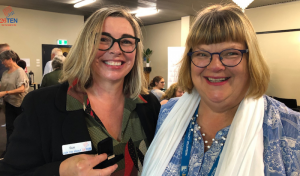
Not everyone who needs help with forms or applications has low literacy, Beylara says but for those who do, raising the issue requires sensitivity.
‘We work closely with 26TEN – the Tasmanian service that helps people with literacy and numeracy – and we’ve had success in getting people to ask for referral for ongoing help with their reading and writing.’
The role of the service in empowering often vulnerable and disadvantaged people inspires Beylara. ‘The Legal Literacy volunteer service is social justice in action. This program is a fantastic way of educating people – our volunteers as well as our clients – in concepts they would never be exposed to, and they in turn educate their friends and relations.’
‘What I most enjoy is the feeling that I’ve made a difference no matter how small, that I’ve helped someone on the next step to what they want to achieve.’ Sadie Roberts, Legal Literacy volunteer
Volunteer Sadie says it’s rewarding work.
‘It’s a valuable service because people in distress can’t think straight, and they’re under time pressure because they need money to live. But it’s a matter of being aware of that and being able to take things slowly because often things will come out that are bothering that person that might not have much to do with the form. So I make encouraging noises and allow people to let off a bit of steam. Most people are very happy to be helped.
‘The most useful things I learned in my training was to be calm, to listen and not to assume things about people. You have to be prepared for anything.’
Nicky Snare has urged both state as well as the federal government to contribute to continuing the service. ‘After all 54% of the work the volunteers do is assisting people with Centrelink forms so they receive far fewer forms with problems so we are saving the federal government money. As far as we’re concerned, there’s not a down side to it. It doesn’t matter what side of politics you’re on, the legal literacy service is a really good idea.’
‘I love every minute of every day in my job. I get to drive around Tasmania, the most beautiful place in the world. I meet and watch people open up and learn and develop and I get to see people’s lives change for the better.’ Beylara Ra, Legal Literacy Volunteer program coordinator
See the full issue of Quest 2, 2019



